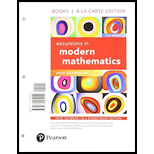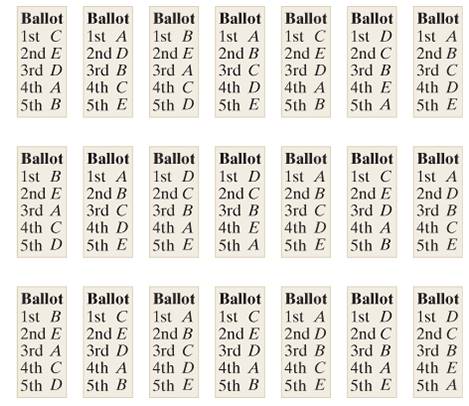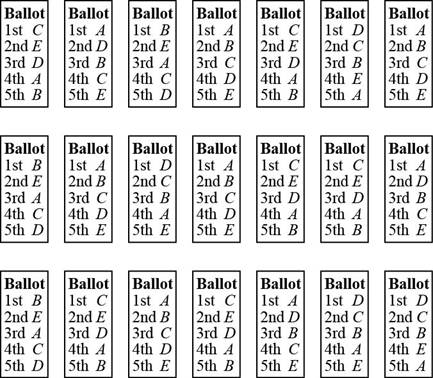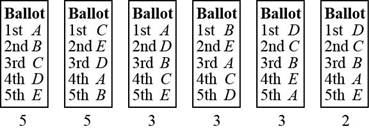Problem 1E: Figure 1-8 shows the preference ballots for an election with 21 voters and 5 candidates. Write out... Problem 2E: Figure 1-9 shows the preference ballots for an election with 17 voters and 4 candidates. Write out... Problem 3E: An election is held to choose the Chair of the Mathematics Department at Tasmania State University.... Problem 4E: The student body at Eureka High School is having an election for Homecoming Queen. The candidates... Problem 5E: An election is held using the printed-names format for the preference ballots. Table 1-27 shows the... Problem 6E Problem 7E Problem 8E: Table 1-30 shows a conventional preference schedule for an election. Rewrite Table 1-30 using a... Problem 9E: The Demublican Party is holding its annual convention. The 1500 voting delegates are choosing among... Problem 10E: The Epicurean Society is holding its annual election for president. The three candidates are A, B,... Problem 11E: Table 1-31 shows the preference schedule for an election with four candidates A, B, C, and D. Use... Problem 12E: Table 1-32 shows the preference schedule for an election with four candidates A, B, C, and D. Use... Problem 13E: Table 1-33 shows the preference schedule for an election with four candidates A, B, C, and D. Use... Problem 14E: Table 1-34 shows the preference schedule for an election with four candidates A, B, C, and D. Use... Problem 15E: Table 1-35 shows the preference schedule for an election with five candidates A, B, C, D, and E. The... Problem 16E: Table1-36 shows the preference schedule for an election with five candidates A, B, C, D, and E. The... Problem 17E: Table 1-25 see Exercise 3 shows the preference schedule for an election with five candidates A, B,... Problem 18E: Table 1-26 see Exercise 4 shows the preference schedule for an election with five candidates A, B, C... Problem 19E: Table 1-25 see Exercise 3 shows the preference schedule for an election with five candidates A, B,... Problem 20E: Table 1-26 see Exercise 4 shows the preference schedule for an election with five candidates A, B, C... Problem 21E: Table 1-31see Exercise 11 shows the preference schedule for an election with four candidates A. B,... Problem 22E: Table 1-32 see Exercise 12 shows the preference schedule for an election with four candidates A, B,... Problem 23E: Table 1-33 see Exercise 13 shows the preference schedule for an election with four candidates A, B,... Problem 24E: Table 1-34 Number of voters 6 6 5 4 3 3 1st A B B D A B 2nd C C C A B A 3rd D A D C C C 4th B D A B... Problem 25E: Table 1-35 Percent of voters 24 23 19 14 11 9 1st C D D B A D 2nd A A A C C C 3rd B C E A B A 4th E... Problem 26E: Table 1-36 Percent of voters 25 21 15 12 10 9 8 1st C E B A C C C 2nd E D D D D B E 3rd D B E B E A... Problem 27E: The Heisman Award. Table 1-37 shows the results of the balloting for the Heisman Award. Find the... Problem 28E: The 2014 AL Cy Young Award. Table 1-38 shows the top 5 finalists for the 2014 American League Cy... Problem 29E: An election was held using the conventional Borda count method. There were four candidates (A, B, C.... Problem 30E: Imagine that in the voting for the American League Cy Young Award (7 points for first place, points... Problem 31E: Table 1-31 see Exercise 11 shows the preference schedule for an election with four candidates A. B,... Problem 32E: Table 1-32 see Exercise 12 shows the preference schedule for an election with four candidates A. B,... Problem 33E: Table1-33 Number of voters 6 5 4 2 2 2 2 1st C A B B C C C 2nd D D D A B B D 3rd A C C C A D B 4th B... Problem 34E: Table 1-34 See Exercise 14 shows the preference schedule for an election with four candidates A. B,... Problem 35E: Table1-39_ shows the preference schedule for an election with five candidates A, B, C, D, and E.... Problem 36E: Table1-40_ shows the preference schedule for an election with five candidates A, B, C, D and E. Find... Problem 37E: Table 1-35 see Exercise 15 shows the preference schedule for election with five candidates A, B, C,... Problem 38E: Table 1-36 see Exercise 16 shows the preference schedule for an election with five candidates A, B,... Problem 39E: Top-Two Instant-Runoff Voting. Exercises 39 and 40 refer to a simple variation of the... Problem 40E: Top-Two Instant-Runoff Voting. Exercises 39 and 40 refer to a simple variation of the... Problem 41E: Table 1-31 see Exercise 11 shows the preference schedule for an election with four candidates A. B,... Problem 42E: Table 1-32 See Exercise 12 shows the preference schedule for an election with four candidates A. B,... Problem 43E: Table 1-33 see Exercise 13 shows the preference schedule for an election with four candidates A. B,... Problem 44E: Table 1-34 see Exercise 14 shows the preference schedule for an election with four candidates A. B,... Problem 45E: Table 1-35 see Exercise 15 shows the preference schedule for an election with five candidates A, B,... Problem 46E: Table 1-36 see Exercise 16 shows the preference schedule for an election with five candidates A, B,... Problem 47E: Table 1-39 see Exercise 35 shows the preference schedule for an election with 5 candidates. Find the... Problem 48E: Table1-40 see Exercise36 shows the preference schedule for an election with 5 candidates. Find the... Problem 49E: An election with five candidates A, B. C, D, and E is decided using the method of pairwise... Problem 50E: An election with six candidates A, B, C, D, E, and F is decided using the method of pairwise... Problem 51E: Use Table 1-41 to illustrate why the Borda count method violates the Condorcet criterion. Table 1-41... Problem 52E: Use Table 1-32 to illustrate why the plurality-with-elimination method violates the Condorcet... Problem 53E: Use Table 1-42 to illustrate why the plurality method violates the IIA criterion.Hint: Find the... Problem 54E: Use the Math Club election Example 1.10 to illustrate why the Borda count method violates the IIA... Problem 55E: Use Table 1-43 to illustrate why the plurality-with-elimination method violates the IIA criterion.... Problem 56E: Explain why the method of pair wise comparisons satisfies the majority criterion. Problem 57E Problem 58E: Explain why the plurality method satisfies the monotonicity criterion. Problem 59E: Explain why the Borda count method satisfies the monotonicity criterion. Problem 60E: Explain why the method of pairwise comparisons satisfies the monotonicity criterion. Problem 61E: Two-candidate elections. Explain why when there are only two candidates, the four voting methods we... Problem 62E: Alternative version of the Borda count. The following simple variation of the conventional Borda... Problem 63E: Reverse Borda count. Another commonly used variation of the conventional Borda count method is the... Problem 64E: The average ranking. The average ranking of a candidate is obtained by taking the place of the... Problem 65E: The 2006 Associated Press college football poll. The AP college football poll is a ranking of the... Problem 66E: The Pareto criterion. The following fairness criterion was proposed by Italian economist Vilfredo... Problem 67E: The 2003-2004 NBA Rookie of the Year vote. Each year, a panel of broadcasters and sportswriters... Problem 68E: Top-two IRV is a variation of the plurality-with-elimination method in which all the candidates... Problem 69E: The Coombs method. This method is just like the plurality-with-elimination method except that in... Problem 70E: Bucklin voting. This method was used in the early part of the 20th century to determine winners of... Problem 71E: The 2016 NBA MVP vote. The National Basketball Association Most Valuable Player is chosen using a... Problem 72E: The Condorcet loser criterion. If there is a candidate who loses in a one-to-one comparison to each... Problem 73E: Consider the following fairness criterion: If a majority of the voters have candidate X ranked last,... Problem 74E: Suppose that the following was proposed as a fairness criterion: If a majority of the voters rank X... Problem 75E: Consider a modified Borda count where a first-place vote is worth F points FN where N denotes the... format_list_bulleted




 Discrete Mathematics and Its Applications ( 8th I...MathISBN:9781259676512Author:Kenneth H RosenPublisher:McGraw-Hill Education
Discrete Mathematics and Its Applications ( 8th I...MathISBN:9781259676512Author:Kenneth H RosenPublisher:McGraw-Hill Education Mathematics for Elementary Teachers with Activiti...MathISBN:9780134392790Author:Beckmann, SybillaPublisher:PEARSON
Mathematics for Elementary Teachers with Activiti...MathISBN:9780134392790Author:Beckmann, SybillaPublisher:PEARSON
 Thinking Mathematically (7th Edition)MathISBN:9780134683713Author:Robert F. BlitzerPublisher:PEARSON
Thinking Mathematically (7th Edition)MathISBN:9780134683713Author:Robert F. BlitzerPublisher:PEARSON Discrete Mathematics With ApplicationsMathISBN:9781337694193Author:EPP, Susanna S.Publisher:Cengage Learning,
Discrete Mathematics With ApplicationsMathISBN:9781337694193Author:EPP, Susanna S.Publisher:Cengage Learning, Pathways To Math Literacy (looseleaf)MathISBN:9781259985607Author:David Sobecki Professor, Brian A. MercerPublisher:McGraw-Hill Education
Pathways To Math Literacy (looseleaf)MathISBN:9781259985607Author:David Sobecki Professor, Brian A. MercerPublisher:McGraw-Hill Education




